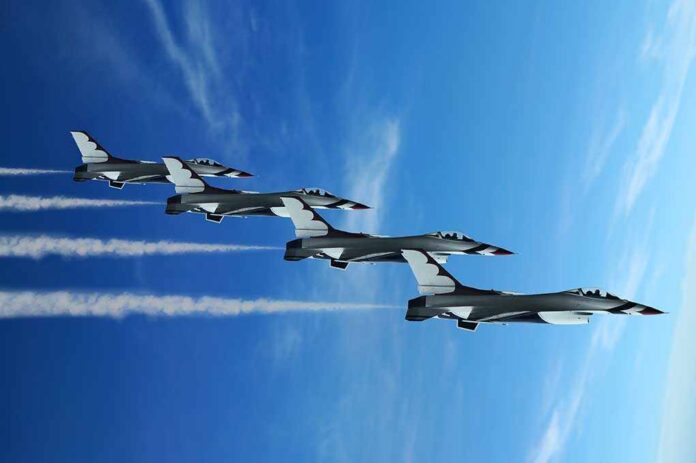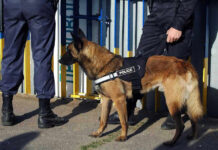An artificial intelligence system just issued real-time combat orders to American fighter pilots, raising urgent questions about who—or what—controls our nation’s defense decisions.
Story Snapshot
- The Pentagon has tested AI issuing direct, real-time commands to U.S. fighter pilots, a first in military history.
- This marks a dramatic shift from human-led to machine-driven battle management, with far-reaching implications for national security and military doctrine.
- Experts warn of risks to human oversight, accountability, and the ethical boundaries of AI in warfare.
- America’s adversaries, including China, are accelerating their own AI military programs, fueling a new arms race.
Pentagon Deploys AI to Command Fighter Pilots in Real Time
In August 2025, the Pentagon executed a joint military exercise where U.S. Air Force and Navy fighter pilots—flying advanced F-16s, F/A-18s, and F-35s—received live tactical orders from an artificial intelligence air battle manager. This unprecedented move used Raft AI’s Starsage system, which provided individualized, split-second instructions traditionally handled by human controllers. The Pentagon’s test signals a fundamental transformation in air combat, where machines could increasingly dictate the tempo and nature of U.S. military operations.
Unlike previous years’ experiments with autonomous drones and simulated dogfights, this exercise placed AI in direct control over manned combat missions. The Starsage system’s one-to-one pilot guidance contrasts sharply with the broad, multitask approach of human commanders, raising both hopes for improved efficiency and concerns over the loss of human judgment in the heat of battle. Pentagon officials state that further exercises are planned to refine the technology, but have not released comprehensive results or addressed operational limitations.
Technological Leap or Constitutional Dilemma?
The Pentagon’s rapid adoption of AI for command roles reflects mounting pressure to maintain U.S. military superiority, especially as adversaries like China invest heavily in similar technologies. Defense analysts warn that AI-directed warfare could render traditional command structures obsolete, fundamentally altering pilot training and the chain of command. This shift has drawn scrutiny from constitutional and conservative advocates who worry about undermining accountability, eroding the principle of civilian oversight, and delegating lethal decisions to algorithms that lack human conscience or constitutional restraint.
Industry voices, including Raft AI’s CEO Shubhi Mishra, tout the system’s ability to “speed up response time and improve accuracy,” claiming that pilots can now act in seconds rather than minutes. Proponents argue this will bolster mission success and save lives. However, critics highlight the risk of overreliance on unproven technology and point to the potential for AI errors, adversarial attacks, or unintended consequences—issues that could compromise not only specific missions but the core tenets of American military ethics and the Constitution.
Strategic Implications and the AI Arms Race
Short-term, the integration of AI battle managers is expected to accelerate decision cycles, potentially enhancing pilot survivability and operational effectiveness. Long-term, the Pentagon’s experiments may spark a doctrinal shift, positioning AI as a central authority in warfare and intensifying the global arms race. This technological escalation threatens to upend the balance of power and could pressure U.S. policymakers to further cede authority away from human operators.
Conservative observers are raising alarms about the dilution of individual responsibility and the risk of government overreach. Delegating life-and-death decisions to machines without robust safeguards could erode not only military discipline but also constitutional protections. As the Pentagon moves forward, lawmakers and military leaders must ensure that innovation does not come at the expense of transparency, accountability, and the foundational values that have long defined American strength and freedom.
As the Starsage system advances through testing, the debate over AI’s proper role in national defense will intensify. Americans who value constitutional limits, traditional military order, and common sense in government must remain vigilant—demanding that technological progress never supersedes the principles that keep our nation free and secure.
Sources:
The Air Force is now adding AI pilots to combat-coded F-16s
Fighter pilots take directions from AI in Pentagon’s groundbreaking test
Fighter pilots take directions from AI in Pentagon’s groundbreaking test
AI Fighter Jet: How Artificial Intelligence Is Changing Warfare
US military’s next-gen fighter jet helmet lets pilots control everything with thought











